|
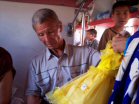
Train or no train, we all admire the tutu-seller's tutus
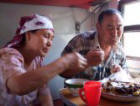
Train or no train, we eat just as well as back home
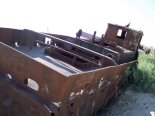
What's left from Aral sea |
|
|
 June 29 June 29 The people who wish they were Kazaks! I had been warned by my travel guide:
I was entering one of the most miserable regions on Earth. While I was about it, I figured I may as well start with the most depressing town, Mouniak, once a fishing port on the Aral
Sea, but which now sits at the edge of an ocean of dunes and steppe where the only things still adrift are some tiny seashells and a few rusting old boats. The silence is even more
stunning... There is a road running through the small town, but nowadays there is seldom a single car on it. The inhabitants walk in silence through what you gradually realise is no
more than a dull village, with a school and college that are way too big for it and which is struggling to survive by raising livestock and farming the surrounding land. Everything
here is dismally sad. The old people are still here. Some would give anything to have enough money to go and live in a bigger town. As for the young people, they are few and far
between. I was lucky enough to be able to visit what's left of the old fish cannery. For a while, after the sea had disappeared, they brought fish all the way here from the Baltic!
But, surprise surprise, this business model proved unworkable in the long term!
No sooner had I escaped from this centre for chronic depressives than, just to add to the vision of Paradise evoked by the countryside, I fell sick as a dog.
Welcome to West Uzbekistan, to a region whose name sounds like somewhere out of the adventures of Tintin: Karakalpakstan. As soon as I stepped off the train (the train journey alone
provided enough material for another twenty pages), I realised I had arrived in a totally other dimension. Seen from here, Kazakhstan is Eldorado, and that's an understatement! My
host, who I met on the train, earns his meagre income by selling meat from Uzbekistan.
The people around here don't have just one or two kids, they have at least five, the shops are empty and prices have dropped lower than ever before and, at my hosts' house, our meals
are served with a liberal sprinkling of flies! The Karakalpaks speak a language that is slightly different from Uzbek and quite similar to Kazak. I learned that many people here have
it marked on their passports that they are originally from Kazakhstan so that it's easier to go there for work.
And yet, the land here is greener than on the other side of the border, thanks to the irrigation system linked to the immense river that runs through the region: the Amou-Daria.
Planted under Soviet rule, the cotton fields stretch as far as the eye can see and it is mainly because they have drained all the water that the Aral Sea has dried up (I did tell the
farmer I met to stop growing his crops immediately, but he pretended not to understand me!). So, I went from drought to stifling heat and humidity! But I prefer...
As for the people I've met this last week, I'll only mention two Dutch guys on bikes (and who have a website in Dutch: www.gekopfietsen.nl). They are going much further than me and
one has been on the road for 25 years! I had already met a couple of German cyclists back in Russia. It really is a small world! |
|
|
|
|
|
|
 June 25 June 25
In my Kazakh family, the Russians After four days in my Kazakh family, I was beginning to feel at home. A soft bed, cable, cyber cafés,
beaches, restaurants on the banks of the Caspian, ice cream sellers at every street corner (in the strict sense of the term), a charming Russian teacher …. I had even less desire
to leave because I had the benefit of being a little ahead of my plans and having some new rights over the remote control. Still treating me as though I was an old family friend,
my hosts finished by offering me a flat for me alone for the following week. I declined: I still have places where nobody goes to discover and to uncover!
But this short week living at the rhythm of this family taught me a great deal: between the picnics on the beach, the crayfish fishing parties, and the many meetings with friends,
I was finally able to decode things a little better, even if, during this stay in Aktyrau, I met very few true Kazakhs.
My family are of Russian origin and so are most of their friends. There is certainly mixing between the two populations, and the Kazakhs in the towns are certainly very Russified,
but in spite of everything, differences and boundaries remain: the standard of living, traditions, religion (even if they are rarely practising, the Kazakhs are Muslim and the
Russians Orthodox, which does not make mixed marriages simple!) ….
Furthermore, all Kazakhs have, written in their passport, what they call their “nationality” (but which is in fact their ethnic origin)
The Kazakhs of Russian origin that I met appeared to consider themselves a little abandoned since the independence of the country. The ethnic Kazakhs have known something of a
social rise in the last few years when many Russians have preferred to return to Russia. What appears to annoy those that I met most is the way in which the Kazakh language is
being imposed on both their papers and their work. For example they complain of the difficulties in finding work when they do not speak Kazakh. For how much longer will football
matches have commentaries sometimes in Kazakh, sometimes in Russian? Imposing a single language on the country appears even harder because the pure Kazakhs represent only 50 % of
the population of the country! The others are Russian, Ukrainian, Tartars, etc …
Anyway, everyone celebrates the Kazakh (in March) and Russian New Years together. The Russians do not distinguish Christmas from New Year, which seems logical enough: on the 25th
December in what year was the good Lord Jesus born?
With this highly philosophical question, I leave you. I hope that those of you who are going away on holiday will not completely forget our site. And that the others will continue
to travel with us!
|
|
|
|
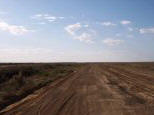
I had more than 130 kilometres of desert tracks to contend with. I even fell flat on my face at one point. The tricky part is telling the difference between the quicksand and
the hard sand. Still, what with the trucks roaring past to overtake me and the swirling dust storms, it's really the only way to travel. I even succeeded in not sleeping alone
out on the steppe… thanks to the scorpions, snakes and spiders.
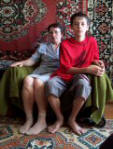
The mum is Russian and the dad Kazak. The latter, who wasn't home on the day that I arrived, stopped by the roadside
to invite me to stay at his house, in his really tiny village. I got there a day later.
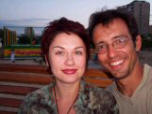
With my hostess in Aktyrau. She works in a beauty parlour. As in other towns, Kazaks and Russians live side by side.
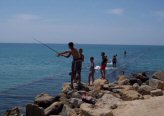
I love the Caspian Sea because I deserve it! The water is crystal clear although at the moment, and for the next month or so, it is very, very cold.
|
|
|
 June 23rd June 23rd
My Kazaks and I...
My hostess doesn't seem to be worried about why exactly I seem to have taken up residence in her home for a few days. As if it's the most natural thing in the
world, this 27-year old Russian woman is sharing her apartment with me, along with her daughter, her mother and her mother's boyfriend. I feel like an old friend. And yet, if I am
here, it's because I poked my head round the door of the garage where her brother-in-law works, a few hundred kilometres away, to ask if they could keep an eye on my bike while I
took the train to the seaside for the day. And so, here I am in Aktyrau, with this young woman who paints her nails and decorates them with little flowers and who gets dressed up
to the nines even if she's just nipping out to the corner shop. Although it must be said, we are in a pretty trendy town here…
Caught between the sea and the desert, the town's uranium mines have shut down and it has now become a popular local tourist resort. This has been no easy feat, since the town is
little more than an endless row of buildings. The streets here don't even have names and people's addresses are just a string of numbers. However, it does have the Caspian Sea,
with its clear water and the beaches… It feels good to be here: I'm taking an intensive Russian course and working on getting an all-over tan. I did warn my hostess: I have no idea
how long I'm going to stay…
I have to say, here in Kazakhstan, I have met none but the very warmest of people. I have also had an insider's view of the daily lives of the people who live in both the smallest
villages and biggest cities alike. There was the Russian-Kazak family with the son who liked Eminem and was just getting to grips with his new computer. We are all so similar, and
yet so very different: there was not a single tarmac road in the village. Then there was the woman who took me in because of the violent winds. She was helping her neighbour, who
had been a widow for just 40 days, make supper to mark the anniversary of her husband's death. Here, they commemorate 40 days, 100 days and then one year after someone has died. I
made myself scarce and went to play with the kids… Then there was that technician who worked in the oil industry and had used his wages to open a café and "salon" with a jacuzzi,
sauna and pool table in one of the tiny villages north of the Caspian Sea. And of course, there was my mechanic whose garage only had one car to repair: his own. So, supper was
meagre: seaweed salad and bread. A situation that this man, whose had had a somewhat troubled past, figures will improve. He knows that there is treasure in the desert, just a few
hundred kilometres away, and he has already invested 2,000 dollars in a metal detector he bought in Moscow.
I've met some truly wonderful characters, and been able to understand a bit about them thanks to the progress I've made in Russian. I have tried not to be a burden, financially
that is, or to compensate for my presence with gifts. Thanks to these people, I will leave Kazakhstan with the most amazing memories, in spite of the desert, the heat and the roads.
I'm going to cross the rest of the desert by train – thereby avoiding an entire part of it where there are no roads and where drivers have to use GPS or the North Star to see where
they are going. So, next stop Uzbekistan. I'm already beginning to panic about arriving without any local currency and lots of heavy luggage. But I reckon the hardest part is
behind me…
|
|
|
|
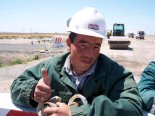
One of many workers, near Tinguis
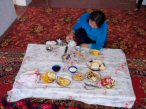
Invited to a local's home
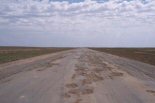
ven the tarmac roads are not all in perfect nick! !

An ox wanders through the city
|
|
|
 June, 17 June, 17
Crossing the desert Sorry - no news there for a while, a silence explained by a long trek across the desert, a real desert… After leaving my shepherd, I had four solid days of steppe under the pouring
rain. Did I see a mirage? I'm not sure, but I did see some camels where I thought the Caspian should be. Apparently, it was just a few kilometres away, but with no tarmac roads
leading to it…
I was completely exhausted from looking for refreshment down every back street of every village that I passed through, and my heart sank low right down to my trainers (and believe
me, my trainers stink!). Was this the journey I'd been dreaming of for so long? In the middle of this emotional desert, an angel appeared and saved me, in the form of a Polish
trucker who offered to take me to stay in the Catholic church in Atyrau, THE big city north of the Caspian Sea.
I didn't take much persuading… and I ended up staying there for four days with the Polish Fathers! Their faithful followers include foreigners travelling through this oil-rich region,
and Kazaks of German or Polish origin, two minorities who have been settled here for centuries. The Orthodox Church does not look too kindly on the fact that the Catholics show such
an interest in these communities which, although deeply "Russian-influenced", have no Orthodox past.
In general, all the citizens of Atyrau speak Russian on an everyday basis. Kazak is spoken, mainly in the villages where the people also speak Russian most of the time. So, in
schools, the percentage of lessons taught in Russian or Kazak varies from one place to another…
Feeling rested and refreshed, I set off once more across the desert (which was no longer an emotional desert this time). It had turned into a challenge rather than a trial. I wanted
to get as far as possible by bike, namely as far as Bineo. This was quite a major physical achievement for me: sometimes I went for a hundred kilometres or more without seeing a
single village and, what's more, I went for one 130-kilometre stretch on a dirt track!
There is oil in these parts, but no one has thought of improving the roads! Passing the Ural River in Atyrau, I didn't just change continent, I changed planet. Indeed, most of the
Kazaks here don't know exactly where Odessa is… But that doesn't stop them from being really curious and very friendly. They have no hesitation inviting me to stay with them: in the
last ten days or so, I've spent only one night in my tent or a hotel!
I spent last night in Tenguis, to the east of the Caspian Sea. Right in the heart of the desert, an oil refinery and a town have sprung up in under twenty years. Practically all the
buildings here are prefabs, making this strange place look like a military base which is inhabited by huge numbers of locals and foreigners who work at the refinery.
Lastly, this part of the journey has also been marked by one puncture after another, obviously caused by the dreadful state of the roads. But still, I have survived it all and it is
all gradually blurring into a fond memory! |
|
|
|
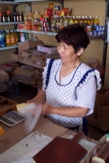
Even before entering Kazakhstan, there are many Kazakhs in Russian villages.
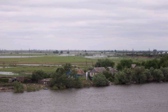
The marshy landscapes formed by the Volga delta. They accompany me for a while on both sides of the Russo-Kazakh frontier.
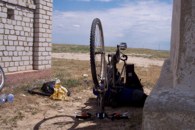
Then, I cross the desert for 300 km. Morale is often low during this ordeal, particularly because the state of the road causes me to puncture twice when I have given my spare inner tubes to Thècle
by mistake!
|
|
|
 June, 7 June, 7
Atyrau,
Proudly showing off my Russian vocabulary, I ask: “Are those potatoes?”
- “No, they are cows”, replies the herdsman, the first Kazakh to whom I have spoken.
Night falls, I show him my bicycle and ask him if I can put my tent up next to his small house. Straight away, he offers to let me sleep inside. But first, he has to lead his cows further away, into a corner of this marshy landscape where he seems to be the only living soul.
I wait. Night has fallen when he returns. We enter his small cement house. In the dark I hear a woman’s voice. It is his wife. She lights an oil lamp and places herself, seated on the ground, at the small table where we will eat. She does not speak Russian and will hardly look at me. The room has no furniture, there are only the mats on which we sit and the small low table. The woman takes out butter, milk, and small pieces of dried cheese. All these dairy products, accompanied by bread and milky tea, comprise our only meal in the evening, then again in the morning.
Like many retired people, my host, a former lorry driver, has had to find work to supplement his income. Of course he has another house in the village, over there, but poverty is definitely present. He does not even complain about it and loves his president, just like the last rulers of the USSR (At last, I have found someone who really loves Gorbi!), even if, at the time, he says, “You had the right to have one cow or two at most.” He remembers Brezhnev’s time with more bitterness, “Then it was even difficult to buy bread.” Did he know that under the dry land, there are millions of dollars of
oil?
I go to sleep about 11 o‘clock, in a completely empty room. In the morning, about 6 o’clock, the old man poses a thousand questions. “What language do you speak in France? English?” Was Karl Marx French? Which sea is in France? Are there cows over there?
- “Yes, but I have none.”
- “But you are young!”
The old woman goes to milk the cows. She finally looks at me to offer me pieces of cheese for the road. I left them my apricot juice and the rest of the popcorn bread that I had brought out the day
before.
I have been a guest of the simple people of the world for years now. They have moulded me and taught me to focus on the essentials, on respect for your fellow man. It is they, I believe, who have taught me to be insensitive to a large part of the futility of the world.
|
|
|
|
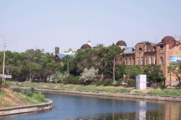
Built on the delta formed by the Volga as it meets the Caspian Sea, Astrakhan is criss-crossed by lots of canals. But the Sea is actually 100 kilometres away…
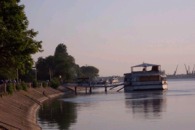
A barge on the Volga. There's dancing and singing. The latest hit in Russia is called “Paris”.
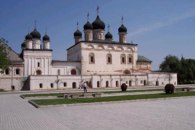
|
|
|
 June, 2 June, 2
Astrakhan,
On our knees and on the Volga A wind that stopped us going over 10 km/hour, Thècle's knee that was more than just worrying, the fact that there was not one roadside
café for another 60 kilometres, a landscape that was dizzyingly barren, combined with the desire to get to Astrakhan and relax a bit…
All this eventually got the better of us and we have come the last 150 kilometres by bus. Since the beginning of the journey, this is the third time I have opted for this means of
making up for lost time and frankly, having cycled over 2580 km, I can't say I'm sorry.
We spent our last night on the Kalmoukie steppe with a Russian family, in an elongated village consisting of three streets.
Far from anywhere, with Thècle's knee wrapped in a vodka compress, we watched, on one of the two TV channels that you can get here, the latest developments in the popular Real TV
series. Our hosts, who own a roadside café, seem to be relatively well-off. But then again, what would you spend your money on in a place like this? So, in their large house, they
have put a TV in every room, and they have a microwave… Basically, they have all electrical mod cons, but are still waiting for the day when the village will get running water.
Now I'm in Astrakhan, and Thècle has just left. This is the centre for caviar but it seems to have escaped the traditional ravages of urban life under the communists. The gorgeous
multicoloured buildings nestle with little wooden houses. The town centre is quiet, with no cars and young people flock to the banks of the Volga to swim, fish, eat meat kebabs
with tons of onions in the cafés or dance on the river barges. Basically, this is a town where lazing is an art and where different ethnic groups mingle. Where Elista was
predominantly Kalmouk and Russian, here a thousand different faces and costumes from the former USSR rub elbows with native Russians. As I was buying a wonderful portrait of
Vladimir Poutine, I asked the pretty, chic yet conservative woman beside whether she liked this icon. In fact, she was Tchechen…
There are some Kazaks around in these parts too (one of them, a night watchman, let us pitch our tent in the courtyard of the offices he was guarding, so we managed to save the
cost of one night at a hotel). We are a few kilometres away from Kazakhstan where new adventures await me before Seb joins me at the end of June to help me reform the Russian
language. This three-day break should, I hope, perk me up before I go on to tackle this land where the heat and the desert are worrying me: I already have pain in my knees and keep
having coughing fits due to the violent winds on the steppe. |
|
|
![]()
![]()
![]()

















